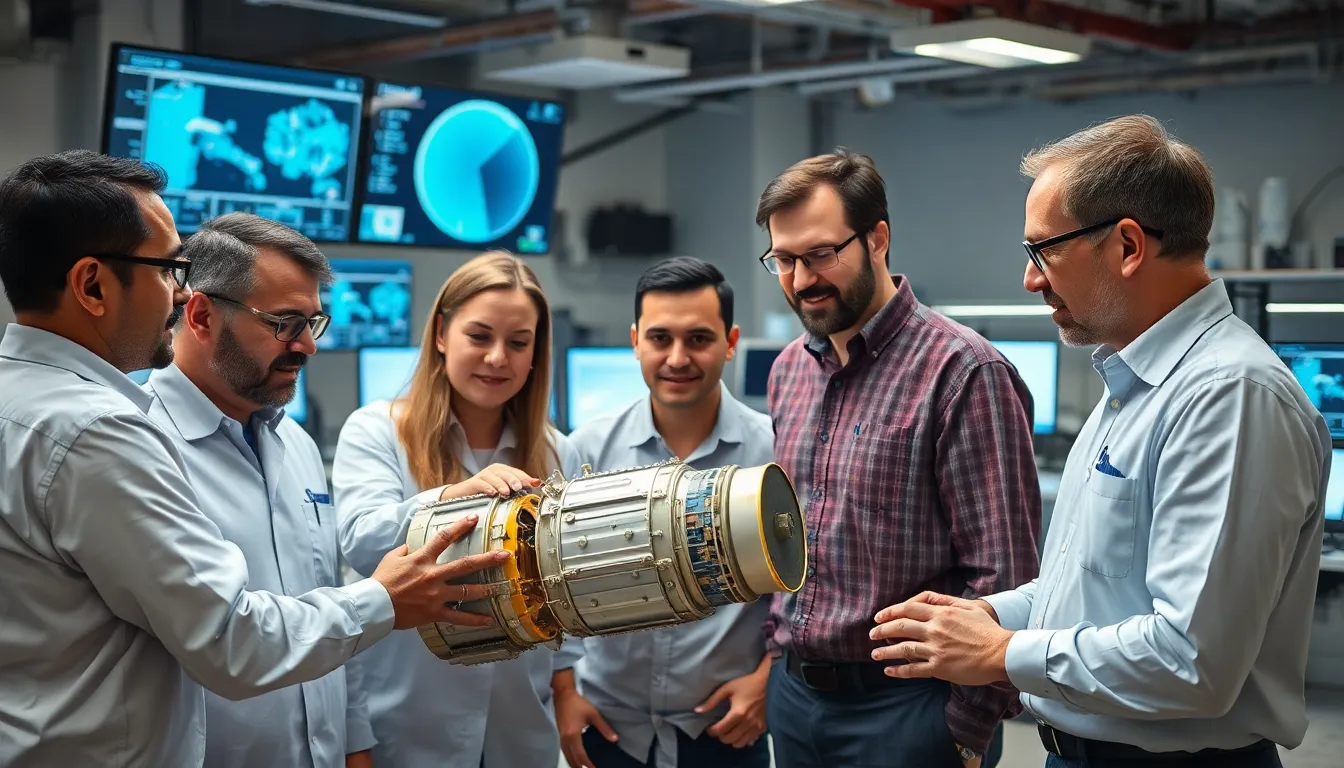Table of Contents
ToggleIn a universe where the final frontier isn’t just for astronauts and sci-fi enthusiasts, space tech startups are launching into the spotlight. These innovative companies are redefining what it means to reach for the stars, and they’re doing it with a mix of ambition and a dash of humor. Who knew that while you were binge-watching your favorite space series, a group of brilliant minds was busy crafting the next generation of satellite technology or planning a trip to Mars?
Overview of Space Tech Startups
Space tech startups play a crucial role in advancing technologies that drive space exploration. Innovative companies focus on satellite launches, propulsion systems, and extraterrestrial habitats. Many seek to address challenges such as space debris management and efficient propulsion methods.
In 2022, the space tech industry attracted over $15 billion in investments. Investors recognize the potential for significant returns as commercial space flights and satellite services expand. Notable startups include SpaceX, which revolutionized rocket recovery, and Planet Labs, which offers high-frequency Earth imaging.
Emerging players often leverage hybrid approaches, combining traditional aerospace engineering with cutting-edge tech. Startups like Relativity Space utilize 3D printing to fabricate rockets more efficiently and cost-effectively. Others, such as Astra, focus on launching small satellites, catering to specific market demands.
Innovations extend beyond orbital operations; several startups investigate asteroid mining and lunar bases. Companies like Lunar Outpost aim to establish sustainable human presence on the Moon, paving the way for future Mars missions. Research indicates that the lunar ice deposits may hold vital resources, making this an attractive pursuit.
Global partnerships further enhance the capabilities of space tech startups. Collaborations between government agencies and private firms streamline the development process. For instance, NASA’s Commercial Crew Program partners with companies like Boeing and SpaceX, promoting safety and efficiency in transporting astronauts.
Overall, the landscape of space tech startups reflects a vibrant and rapidly evolving industry, emphasizing creativity and collaboration to push boundaries in space exploration.
Key Innovations in Space Technology

Innovations in space technology drive the progress of space exploration. Startups emerge with groundbreaking solutions across various sectors.
Satellite Technology Advancements
Satellite technology sees rapid advancements from new startups. Companies like Planet Labs develop sophisticated Earth observation satellites that provide real-time data. Miniaturization techniques enable smaller, more efficient satellite designs. Fresh approaches in communication satellites enhance global coverage and connectivity. Enhanced imaging technologies support applications ranging from agriculture to disaster response. As a result, these innovations contribute to better decision-making and resource management.
Propulsion Systems
Developments in propulsion systems mark a significant focus for space tech startups. Electric propulsion systems, like those created by companies such as IonQ, offer higher efficiency for long-duration missions. Traditional chemical propulsion sees improvements in thrust-to-weight ratios, maximizing payload capacity. Innovative hybrid systems combine benefits from both technologies, enabling enhanced performance. Additionally, research into nuclear thermal propulsion presents promising avenues for deep space exploration. These advancements play crucial roles in reducing travel times and increasing mission feasibility.
Notable Space Tech Startups
Numerous space tech startups are shaping the future of space exploration and technology. Their innovative approaches and cutting-edge solutions enhance various sectors, from satellite deployment to extraterrestrial habitation.
Company Profiles
SpaceX stands out as a leader in launch services, renowned for its reusable rocket technology that significantly reduces mission costs. Planet Labs develops advanced Earth observation satellites, providing critical data for applications like agriculture and environmental monitoring. Lunar Outpost focuses on establishing sustainable lunar habitats, aiming to support a permanent human presence on the Moon. Other startups, like Blue Origin, are advancing suborbital flight and fostering space tourism, broadening access to space for various audiences.
Market Impact
In 2022, the investment landscape for space tech startups exceeded $15 billion, reflecting a growing interest in commercial space ventures. Startups drive innovation through hybrid technologies and new design methodologies, fostering efficiency in satellite launches and propulsion systems. The emergence of partnerships between private companies and agencies like NASA promotes collaboration, ensuring safety and progress in space missions. Notably, these advancements in satellite technology and propulsion systems enhance mission capabilities, making interplanetary exploration more feasible.
Challenges Facing Space Tech Startups
Space tech startups face significant challenges as they strive to innovate within a highly competitive environment. These hurdles range from securing funding to navigating regulatory complexities.
Funding and Investment
Funding remains a critical challenge for space tech startups. Despite attracting over $15 billion in investments in 2022, many companies struggle to maintain consistent funding. Most early-stage startups rely heavily on venture capital for initial projections. Raising funds often involves demonstrating feasible business models to investors. Those who successfully capture attention can propel their projects forward, but this process can take time and effort. Funding uncertainties can delay progress, hindering the timely development of advanced technologies.
Regulatory Hurdles
Regulatory hurdles often complicate the operational landscape for space tech startups. Complying with various regulations set by national and international agencies requires considerable resources and expertise. Startups may encounter challenges in obtaining launch licenses and meeting safety standards. Each country has unique policies that add layers of complexity to operations. Meeting these requirements is crucial for companies aiming to conduct launches or deploy satellites. Such regulations can slow down timelines, impacting competitiveness in a fast-paced industry.
Future Trends in Space Tech Startups
Emerging technologies in the space tech sector are paving the way for innovative solutions. Incremental advancements in satellite technology continue to transform data collection and distribution. Companies like Planet Labs utilize Earth observation satellites, providing real-time analytics that enhances global monitoring applications.
Significant research into asteroid mining presents opportunities for resource acquisition in space. Lunar Outpost is one example of a startup focusing on establishing a human presence on the Moon, demonstrating the potential of lunar bases for sustainable living.
Developments in propulsion systems are critical for mission success. Electric propulsion improves efficiency for satellite navigation, while traditional chemical propulsion remains essential for heavier payloads. Advanced hybrid systems are entering the market, showcasing adaptability for different mission requirements. The exploration of nuclear thermal propulsion stands out as a groundbreaking approach for deep space missions.
Investment patterns reflect a growing interest in space tech startups. In 2022, the sector secured over $15 billion, highlighting its financial viability and attractiveness to investors. Collaborations between private companies and government agencies, such as NASA’s Commercial Crew Program, significantly boost safety and operational capabilities.
Navigating regulatory environments remains a primary challenge for many startups. Complex regulations can delay development timelines and impact competitiveness. At the same time, securing consistent funding is crucial for long-term sustainability. Many early-stage companies depend on venture capital, emphasizing the need for viable business models to attract investment.
Each of these trends reveals a dynamic landscape driven by creativity and collaboration. As startups explore new avenues and technologies, their impact on space exploration and technology will only increase.
The space tech startup landscape is a dynamic and rapidly evolving arena that showcases human ingenuity and ambition. These companies are not only advancing technology but also redefining the possibilities of space exploration. With substantial investments flowing into the sector and innovative solutions emerging, the future looks promising.
As they tackle challenges such as funding and regulation, these startups continue to inspire a new generation of explorers and innovators. Their contributions to satellite technology propulsion systems and extraterrestrial habitats are paving the way for a sustainable presence beyond Earth. The collaboration between private firms and agencies like NASA further enhances the potential for groundbreaking achievements.
Ultimately, the journey of space tech startups is just beginning, and their impact on the cosmos will resonate for years to come.




